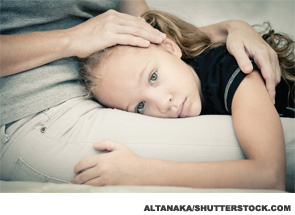
For children in chronic pain, an innovative pain management program that focuses on self-management of symptoms and strong parental involvement is showing promising effects on reducing pain and improving function in these children.
Key to the program, according to Rachael Coakley, PhD, associate director, Psychological Services, Pain Treatment Service, Boston Children’s Hospital, is changing the mindset of the children and their parents to think about pain differently, as well as providing strategies to manage the pain.
Also needed is a change in the mindset of physicians and other healthcare professionals who see children with chronic pain. The goal of the program is for providers to recognize that pain—regardless of origin—improves when children and parents know how to manage the symptoms adaptively.
“Psychological strategies for pain management should be prescribed early as part of a primary intervention for chronic pain instead of waiting until children develop functional disability or significant symptoms of anxiety or depression,” she says, adding that the comment she most often gets from parents is that they feel their kids get referred to psychologists only when there is not much else physicians feel they can do to address the chronic pain.
Dr. Coakley, who designed the program, emphasizes that the program is intended as a primary treatment for chronic pain and pain-related stress and not necessarily as an intervention for mental health problems, such as anxiety or depression.
“Ideally, this intervention functions as an integrated part of a child’s care and is not reserved for kids who have not responded to standard medical protocols,” she says.
Awareness of this program by rheumatologists who see children with chronic pain may provide a needed resource for these children beyond what has traditionally been available for them.
The Comfort Ability
Called the Comfort Ability, the program is designed for children and adolescents ages 10–17 years old with chronic or recurrent pain syndromes and their parents. Children enrolled in the program present with a broad range of pain conditions, including abdominal pain syndromes, neuropathic pain, headaches, fibromyalgia and pain amplification syndrome, as well as disease-related pain. Dr. Coakley emphasized that the strategies used to help these children better cope with their pain is the same regardless of the underlying cause of the pain or different levels of functional disability.
Held at the Pain Treatment Service at Boston Children’s Hospital, the program runs every eight weeks and consists of a one-day, six-hour-long workshop that is held on a Sunday to minimize disruption to school and work schedules. The workshop is divided into two groups that run separately, but simultaneously, for the six hours. One group is for children, and the other is for their parents or adult caretakers.
Children’s Group
Led by clinical psychologists, the children’s group uses a motivational interviewing framework to increase the child’s readiness to change their relationship to the pain they are experiencing. The group provides a framework for educating children on how pain works in the body, teaches coping skills to increase their physical comfort and provides guidance for how children can learn to reframe the impact of pain on their daily living.
According to Dr. Coakley, cognitive behavioral therapy focusing on the relationship between thoughts and behaviors is a major component of the children’s program. Children learn biobehavioral and coping strategies, such as diaphragmatic breathing, guided imagery and mood-boosting activities, that provide them with access to in-the-moment comfort.
Other components include art therapy to help motivate children with peer support to pursue and maintain the coping strategies they learn in the program, an introduction to biofeedback and a chance to experiment with aromatherapy to determine if different scents might increase their experience of comfort or relaxation.
A big part of the workshop, says Dr. Coakley, is inclusion of a testimonial section in which a prior patient and his or her parents return and talk about their experience learning to manage chronic pain.
The day ends with the clinical psychologists helping each child develop his or her own treatment plan. Individualized plans are based on a child’s experience of what strategies and coping techniques were most helpful for managing their discomfort or stress.
Children learn biobehavioral & coping strategies, such as diaphragmatic breathing, guided imagery & mood-boosting activities, that provide them with access to in-the-moment comfort.
Parent’s Group
The main components of the parent’s group include pain education, parent training for how to respond to symptoms and instruction on how to implement behavior modification techniques to help their children manage pain and increase daily activity.
According to Dr. Coakley, who runs the parent group, educating parents on the pathophysiology of pain and helping them fully understand the mind-body connection is critical to the program’s effectiveness. The program also includes discussion about parenting practices, parent–child response patterns and the stress of having a child with chronic pain.
“Importantly, much of the day is devoted to teaching parents how to set up an effective plan at home to help their child become more active and more engaged with valued activities, such as attending school regularly, connecting with friends and participating in sports and hobbies,” says Dr. Coakley.
Urging children in pain to be more active can be counterintuitive for parents, she emphasizes, but critical. “When children have strep throat or a sprained ankle, parents understand that their children need to rest,” she explains. “For children with chronic pain, resting too much can make the pain worse.”
To help parents motivate their children to use adaptive strategies and increase their activity, she teaches such skills as reflective listening and parenting practices that promote positive adaptation. For example, she teaches parents how to reduce their own worrying about their child’s pain, which has the dual effect of helping parents remain calm and preventing children from adopting their parents’ worry as their own. She also emphasizes the importance of parents being good role models for their children by staying active themselves and remaining committed to their own activities.
“This program works because we focus on parent change as much as child change,” emphasizes Dr. Coakley, adding that working with parents separately is key. “There are six hours of training for parents in this program,” she says, “and it is very difficult to obtain that much time with a parent to talk about issues regarding their children outside a dedicated program, such as this.”

Outcomes to Date
At the 2014 Pediatric Rheumatology Symposium (PRYSM) meeting, Dr. Coakley presented outcomes to date on The Comfort Ability program that began in 2010. She presented outcomes on 122 patients, the majority of whom were female (78%), Caucasian (79%), with a mean age of 14 years, and 28 months’ duration of pain. Many of the children in the study reported using various concurrent interventions, such as medication, acupuncture, psychotherapy, physical therapy and self-management strategies.
To evaluate efficacy, Dr. Coakley looked at several outcomes based on reports by both parents and children, and compared responses at baseline to those at one week, one month and three months following the intervention.
At one week, the reports by parents showed significant declines from baseline in measures that looked at worrying about the child’s pain (pain catastrophizing scale [PCS]), protecting the child from pain (Adult Response to Child Symptoms [ARCS]), feeling responsible for the child’s pain (Helping for Health Inventory [HHI]) and Pain Self Efficacy Scale (PSES). These significant improvements were maintained at one month and three months following the intervention.
Similar findings were found based on the reports by children. At one week, children also showed significant declines from baseline in PCS, functional disability and PSES that were maintained over one month and three months.
Overall, the findings indicate that parents reduced their use of pain-reinforcing parenting practices, reduced worrying about their child’s pain, had increased confidence in the child’s ability to manage his or her own pain and were very satisfied with the intervention.
For children, the findings indicate improved pain self-efficacy, reduced catastrophizing symptoms, improved function and reduced pain.
Publication of these findings can be expected in the near future, according to Dr. Coakley, who also has written a book for parents to help their children manage pain that will be published by Yale University Press in 2015.
Future Directions
Based on the current evidence and experience of the program, Dr. Coakley emphasizes the need to establish services, such as this, that make it easy for parents to receive intervention and skills to help their child manage his or her chronic pain, as well as to ensure that parents have access to these services early in their child’s experience of pain or medical stress. She also emphasizes the need for the availability of more comprehensive services for families who need additional support.
To date, most of the children have entered the program through referrals from the Pain Treatment Service at Boston Children’s Hospital. However, many children have been referred by other physicians or have found the program via the website: http://www.childrenshospital.org/centers-and-services/programs/o-_-z/pain-treatment-services-program/multidisciplinary-services/the-comfort-ability.
Dr. Coakley emphasizes, however, that the program is open to the community, and she and her colleagues make every effort to accommodate interested families. The program costs $120 per family for the day. Although insurance does not cover the program, she notes that Boston Children’s Hospital can offer sliding scale fees or scholarships to families who are unable to pay and who qualify for financial support.
Dr. Coakley has recently helped facilitate the start-up of this manualized program at a children’s hospital in Nova Scotia. She and her colleagues are planning to share the program with other interested institutions in the near future.
Mary Beth Nierengarten is a freelance medical journalist based in St. Paul, Minn.

